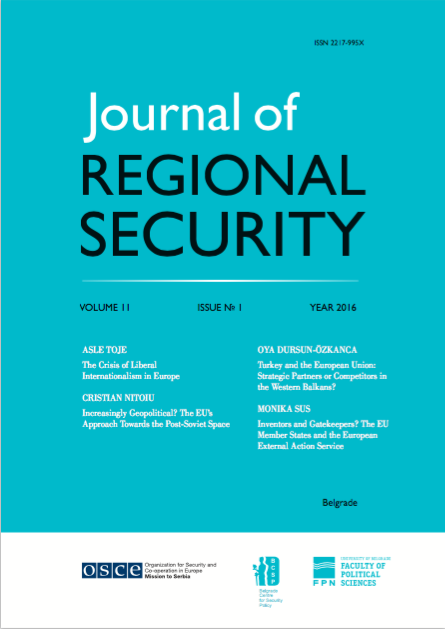Turkey and the European Union: Strategic Part- ners or Competitors in the Western Balkans?
Abstract
Since the 1990s, Turkey and the European Union (EU) have each increasingly pursued active foreign policies in the Western Balkans, aimed at establishing peace, stability, and security in the region. Over the past few years, Turkey’s active foreign policy approach has been frequently labelled as “Neo-Ottomanism”. Against this backdrop of deteriorating relations between the EU and Turkey, Turkey has been attempting to use its soft power potential to consolidate its political, economic, and cultural influence in the Western Balkans. Thearticleexplores the factors contributing to and hindering Turkish influence in the region. It then analyzes factors behind Turkey’s renewed activism within the context of recent developments in EU-Turkey relations. Drawing onan extensive series ofelite interviews conducted in Turkey, the United Kingdom, Serbia, and Bosnia from 2011 to 2013, the article concludes with an examination of whether Turkey and the EU may best be regarded as strategic partners or competitors in the region.
Authors retain copyright of the published papers and grant to the publisher the non-exclusive right to publish the article, to be cited as its original publisher in case of reuse, and to distribute it in all forms and media.
The published articles will be distributed under the Creative Commons Attribution 4.0 International License (CC BY). It is allowed to copy and redistribute the material in any medium or format, and remix, transform, and build upon it for any purpose, even commercially, as long as appropriate credit is given to the original author(s), a link to the license is provided and it is indicated if changes were made. / The published articles will be distributed under the Creative Commons Attribution ShareAlike 4.0 International license (CC BY-SA). It is allowed to copy and redistribute the material in any medium or format, and remix, transform, and build upon it for any purpose, even commercially, as long as appropriate credit is given to the original author(s), a link to the license is provided, it is indicated if changes were made and the new work is distributed under the same license as the original.
Users are required to provide full bibliographic description of the original publication (authors, article title, journal title, volume, issue, pages), as well as its DOI code. In electronic publishing, users are also required to link the content with both the original article published in Journal of Regional Security and the licence used.
Authors are able to enter into separate, additional contractual arrangements for the non-exclusive distribution of the journal's published version of the work (e.g., post it to an institutional repository or publish it in a book), with an acknowledgement of its initial publication in this journal.
Authors are permitted to deposit author’s pre-print / author’s post-print (accepted version) / publisher's version (PDF) of their work in an institutional repository, subject-based repository, author's personal website (including social networking sites, such as ResearchGate, Academia.edu, etc.), and/or departmental website prior or during the submission process / at any time after the acceptance of the manuscript / at any time after publication.
Full bibliographic information (authors, article title, journal title, volume, issue, pages) about the original publication must be provided and links must be made to the article's DOI and the license.

